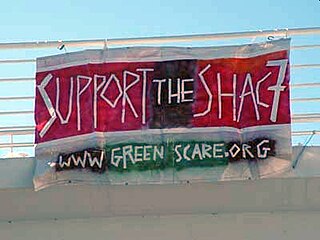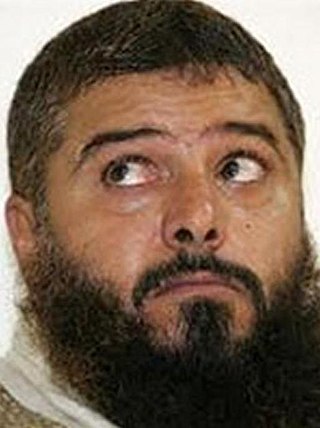Related Research Articles

John Philip Walker Lindh is an American Taliban member who was captured by United States forces as an enemy combatant during the United States' invasion of Afghanistan in November 2001. He was detained at Qala-i-Jangi fortress, used as a prison. He denied participating in the Battle of Qala-i-Jangi, a violent uprising of the Taliban prisoners, stating that he was wounded in the leg and hid in the cellar of the Pink House, in the southern half of the fort. He was one of the 86 prisoners who survived the uprising, from an estimated 400 prisoners in total. CIA officer Johnny "Mike" Spann was killed during that uprising. Brought to trial in United States federal court in February 2002, Lindh accepted a plea bargain; he pleaded guilty to two charges and was sentenced to 20 years in prison. He was released on supervision on May 23, 2019, for a three-year period of supervised release.

The Buffalo Six is a group of six Yemeni-American friends who pled guilty to charges of providing material support to al-Qaeda in December 2003, based on their having attended an al-Qaeda training camp in Afghanistan together in the Spring of 2001. The suspects were facing likely convictions with steeper sentences under the "material support law" which requires no proof that a defendant engaged in terrorism, aided or abetted terrorism, or conspired to commit terrorism.
Earnest James Ujaama is an American community activist and former terrorist suspect.
Maher Mofeid "Mike" Hawash is an American engineer who was convicted and sentenced to a seven-year prison sentence in 2003 for conspiring to aid the Taliban in fighting against U.S. forces and their allies in Afghanistan. Six weeks after 9/11, Hawash secretly traveled to China with a group of Portland-area Muslims, dubbed the Portland Seven, with the intent of entering Afghanistan to aid the Taliban. Hawash and his fellow conspirators were unable to reach Afghanistan due to visa problems, according to federal authorities,
The Portland Seven was a group of American Muslims from the Portland, Oregon area arrested in October 2002 as part of an FBI operation attempting to close down a terrorist cell. The seven were attempting to join al Qaeda forces in their fight against the United States military and coalition forces in Afghanistan, or aiding in that attempt.
Tre Arrow is a green anarchist who gained prominence in the U.S. state of Oregon in the late 1990s and early 2000s for his environmental activism, bid for Congress as a Pacific Green Party candidate, and then for his arrest and later conviction for committing acts of arson on cement and logging trucks. He unsuccessfully sought political asylum in Canada, and was extradited to Portland, Oregon, on February 29, 2008, to face 14 counts of arson and conspiracy. These actions were claimed as acts of protest by the Earth Liberation Front (ELF). On June 3, 2008, Arrow pleaded guilty to 2 counts of arson and was sentenced with 78 months in prison. He was released to a halfway house in 2009.
Operation Backfire is a multi-agency criminal investigation, led by the Federal Bureau of Investigation (FBI), into destructive acts in the name of animal rights and environmental causes in the United States described as eco-terrorism by the FBI. The operation resulted in convictions and imprisonment of a number of people, many of whom were members of the Animal Liberation Front and Earth Liberation Front.

The Green Scare is legal action by the US government against the radical environmental movement, that occurred mostly in the 2000's. It alludes to the Red Scares, periods of fear over communist infiltration of US society.
A Syrian-Kurd, Abd al-Rahim Abdul Rassak al-Janko is a former student in the United Arab Emirates who traveled to Afghanistan in 2000, where he was captured by the Taliban who announced that he had confessed to plotting to murder Osama bin Laden, as well as spying against the Taliban on behalf of Israel and the United States. He was also denounced for "his sexual indiscretions with other young men" and accused of homosexuality. Following the Invasion of Afghanistan, al-Janko begged a British journalist to alert the Americans that he had been held prisoner by the Taliban for two years; however, he was taken from the Taliban prison by American forces, and sent to the Guantanamo Bay detention camps where he spent seven years in detention.

Jaber A. Elbaneh, also known as Gabr al-Bana is a Yemeni-American who was labeled a suspected terrorist by the United States after it emerged that he had attended the Al Farouq training camp alongside the Lackawanna Six, and remained on at the camp after they returned home. He fled to Yemen, where he worked as a cab driver before turning himself in to authorities.

The FBI Seeking Terror Information list is the third major "wanted" list to have been created by the United States Department of Justice's Federal Bureau of Investigation to be used as a primary tool for publicly identifying and tracking down suspected terrorists operating against United States nationals at home and abroad. The first preceding list for this purpose was the FBI Ten Most Wanted Fugitives list. In 2001, after the September 11 attacks, that list was supplanted by the FBI Most Wanted Terrorists list, for the purpose of listing fugitives who are specifically wanted for acts of terrorism.

Habis Abdulla al Saoub, a.k.a. Abu Tarek, was a Jordanian national and member of the Portland Seven, and later a member of an al Qaeda cell. In February 2003, he was added to the FBI Seeking Information - War on Terrorism list, wanted in connection with a federal grand jury indictment returned on October 3, 2002, in United States District Court for the District of Oregon at Portland, Oregon, in which he was charged with conspiracy to levy war against the United States, conspiracy to provide material support and resources to al-Qaeda, conspiracy to contribute services to al-Qaeda and the Taliban, and possessing firearms in furtherance of crimes of violence. The FBI offered a five million dollar reward for his capture.
Muhammad Ibrahim Bilal was a member of a terrorist group dubbed the Portland Seven, some members of which attempted to travel to Afghanistan shortly after 9/11 in order to aid the Taliban. In October 2002, Bilal was indicted and shortly thereafter arrested in Detroit. In 2003, he was sentenced to eight years on gun charges and for conspiracy to aid the Taliban in fighting the United States and coalition forces.
Ahmed Ibrahim Bilal was a member of a terrorist group dubbed the Portland Seven, some members of which attempted to travel to Afghanistan shortly after the September 2001 attack on the World Trade Center (9/11) to aid the Taliban. He was indicted and arrested in Malaysia in October 2002. In 2003, he was sentenced to ten years imprisonment on gun charges and for conspiracy to aid the Taliban in fighting the multinational force in Iraq. He was released on June 27, 2011.
Jeffrey Leon Battle was a member of a terrorist group dubbed the Portland Seven, some members of which attempted to travel to Afghanistan shortly after 9/11 in order to aid the Taliban. He refused to cooperate with the government and was sentenced to eighteen years in prison after pleading guilty to seditious conspiracy and levying war against the United States. He had two years added to his sentence for refusing to testify before a grand jury.
October Martinique Lewis was a member of a terrorist group dubbed the Portland Seven, some members of which attempted to travel to Afghanistan shortly after 9/11 in order to aid the Taliban. Lewis was sentenced to three years in federal prison after cooperating with the government and pleading guilty to six counts of money laundering. Lewis admitted to transferring money abroad to Jeffrey Leon Battle, her ex-husband, in order to assist him in his efforts to aid the Taliban.
Fahd Mohammed Ahmed al-Quso, also known as Abu Huthaifah, Abu Huthaifah Al-Yemeni, Abu Al-Bara', Abu Hathayfah Al-Adani, Abu Huthaifah Al-Adani, Fahd Mohammed Ahmed Al-Awlaqi, Huthaifah Al-Yemeni, or Abu Huthaifah Al-Abu Al-Bara, was alleged to be a terrorist by American and Yemeni officials, and on the FBI Most Wanted Terrorists list. He was wanted by the FBI, Interpol, and the United States Department of State, which had offered 5 million dollars to anyone with information about him. He was killed by a US drone strike in Yemen on 6 May 2012.
Robert Edward Jones is an American politician and judge in Oregon. He serves as a senior United States district judge of the United States District Court for the District of Oregon in Portland. A Portland native, he previously served as the 84th justice of the Oregon Supreme Court and as a member of the Oregon House of Representatives.

In the United States, a common definition of terrorism is the systematic or threatened use of violence in order to create a general climate of fear to intimidate a population or government and thereby effect political, religious, or ideological change. This article serves as a list and a compilation of acts of terrorism, attempts to commit acts of terrorism, and other such items which pertain to terrorist activities which are engaged in by non-state actors or spies who are acting in the interests of state actors or persons who are acting without the approval of foreign governments within the domestic borders of the United States.
In United States law, providing material support for terrorism is a crime prohibited by the USA PATRIOT Act and codified in title 18 of the United States Code, sections 2339A and 2339B. It applies primarily to groups designated as terrorists by the State Department. The four types of support described are "training," "expert advice or assistance," "service," and "personnel."
References
- ↑ "The Making of a "Terrorist"". Willamette Week. Retrieved 2019-10-19.
- 1 2 The Making of a "Terrorist" Archived 2005-12-13 at the Wayback Machine , Willamette Week , June 6, 2002
- ↑ Recordings reveal Portland Seven's brutal mindset Archived 2006-04-03 at the Wayback Machine , KATU , November 20, 2003
- ↑ Jeffrey Battle, Patrice Lumumba Ford sentenced to 18 years in prison for seditious conspiracy, US Department of Justice
- ↑ FBI’S Joint Terrorism Task Force Arrests Four on Terrorism Charges, Two Others Who Were Indicted Are Now Fugitives, FBI Press Release, Portland Field Office, Google Cache, October 4, 2002
- ↑ Letter to the Editor, Portland Oregonian: Portland Seven just scapegoats Archived 2006-11-02 at the Wayback Machine , Lane County Bill of Rights Defense Committee , October 22, 2003
- ↑ Ashcroft Tries to Keep Lawyer Off Portland 7 Case Archived 2006-09-22 at the Wayback Machine , Talkleft , August 15, 2003
- ↑ Two sentenced for trying to join Taliban Archived 2011-06-29 at the Wayback Machine , USA Today , November 24, 2003
- ↑ Portland Seven Archived 2006-05-28 at the Wayback Machine , Lane County Bill of Rights Defense Committee